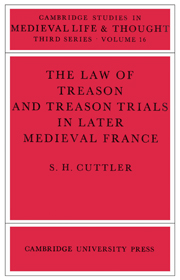Book contents
- Frontmatter
- Contents
- Dedication
- Preface
- Abbreviations
- Introduction
- 1 THE CONCEPT OF TREASON IN LATER MEDIEVAL FRANCE: LEGISTS, ‘COUTUMIERS’ AND TREATISE-WRITERS
- 2 THE CRIMES OF TREASON
- 3 JURISDICTION
- 4 PROCEDURE AND THE TRIAL OF PEERS
- 5 PUNISHMENT, FORFEITURE AND PARDON
- 6 TREASON AND THE CROWN 1328–1356
- 7 TREASON AND THE CROWN 1356–1380
- 8 TREASON AND THE CROWN 1380–1422
- 9 TREASON AND THE CROWN 1422–1461
- 10 TREASON AND THE CROWN 1461–1494
- Conclusion
- Bibliography
- Index
9 - TREASON AND THE CROWN 1422–1461
Published online by Cambridge University Press: 13 October 2009
- Frontmatter
- Contents
- Dedication
- Preface
- Abbreviations
- Introduction
- 1 THE CONCEPT OF TREASON IN LATER MEDIEVAL FRANCE: LEGISTS, ‘COUTUMIERS’ AND TREATISE-WRITERS
- 2 THE CRIMES OF TREASON
- 3 JURISDICTION
- 4 PROCEDURE AND THE TRIAL OF PEERS
- 5 PUNISHMENT, FORFEITURE AND PARDON
- 6 TREASON AND THE CROWN 1328–1356
- 7 TREASON AND THE CROWN 1356–1380
- 8 TREASON AND THE CROWN 1380–1422
- 9 TREASON AND THE CROWN 1422–1461
- 10 TREASON AND THE CROWN 1461–1494
- Conclusion
- Bibliography
- Index
Summary
Little is known about the prosecution of treason during the first fifteen years of Charles VII's reign. A few minor cases only came before the Parlement of Poitiers. Struggling to consolidate his position against the Anglo-Burgundians, Charles VII appears to have tacitly approved of, even to have subtly encouraged, court intrigues. But when political machinations went beyond certain limits, as was the case with Louis d'Amboise, vicomte of Thouars, André de Beaumont, baron of La Haye, and Antoine de Vivonne, Charles VII did not hesitate to act with the full authority at his disposal.
During the winter of 1429–30 Amboise, Beaumont and Vivonne plotted not only to seize Georges de La Trémoïlle, the most powerful lord at court, and to kill him if necessary, but also to take the king into custody. Amboise was one of Artur de Richemont's staunchest allies, and one does not have to look very hard to see the hand of the constable, then fallen from grace, in this conspiracy to take control of the government. Amboise, Beaumont and Vivonne were arrested in mid-November 1430, but it seems that not all the details of their treason were known to the king at that time. When Charles VII decided to take Amboise with him from Loches to Saint-Aignan, Amboise managed to send word to his intimates and advised them to ambush the royal party in order to free him. It was the king's discovery of this communication that sealed Amboise's fate.
He, Vivonne and Beaumont were subsequently imprisoned at Poitiers. Charles VII then commissioned the presidents and lay councillors of the Parlement there, along with several members of the grand conseil, to conduct their trial.
- Type
- Chapter
- Information
- The Law of Treason and Treason Trials in Later Medieval France , pp. 195 - 212Publisher: Cambridge University PressPrint publication year: 1982

